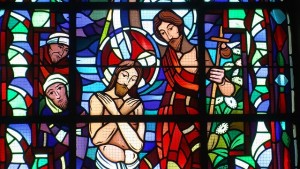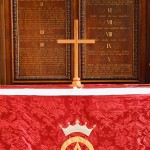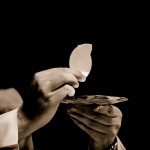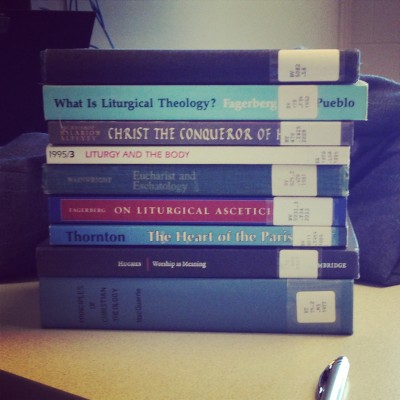A friend recently shared that a young woman in his parish explained that she hates the Creed. He subsequently requested that something be written about the importance of teaching the Creed(s) to young people. There are likely to be many, many articles, books, and blog posts on the topic but here’s my attempt at an answer:
As part of the liturgy every Sunday, the assembled Church proclaims the words of the Nicene Creed (or Apostles’ Creed if connected with the Sacrament of Baptism). I have often heard this liturgical practice described as dull, rote, and boring. For many this is but a chance to stretch the legs after the sermon and to shake off the preacher’s (in)effective words before Eucharist. But why is the Creed viewed this way? Weren’t there councils and centuries of heresy and disagreement that ultimately gave birth to these statements of faith? Is the Creed relevant to my faith today? Keep reading…
The Creed (and I am using a generic “Creed” at this point but by it I mean Nicene-Constantinopolitan, Apostles’ or Athanasian) is far more than theological precision or the fruit of a council some 1700 years ago. The Creed is first and foremost part of the living expression and Tradition of the one holy catholic and apostolic church. The Creed recalls our baptismal covenant and Eucharistic joy, it is Scripture exegeted and digested, it is our corporate memory and shared faith, it is active, and it is certainly theologically robust.
In the Early Church, the Bishop gave the Apostles’ Creed to members of the catechumenate. These men and women were meant to learn, mark, study, and inwardly digest the Creed as part of their preparation for baptism at the Easter Vigil. They were taught and instructed based on the Creed as part of their catechesis. Nothing has changed to this day—at least, nothing needs to have changed.
The catechumens would then be responsible for “handing the Creed back” to the Bishop. That is, these God-fearing men and women would demonstrate their reception of the Creed by proclaiming its words and power to the Bishop. In modern liturgies, the Apostles’ Creed is part of the Liturgy of Baptism because it is the earliest baptismal statement in the Church. To this day we proclaim the Apostles’ Creed because it is the “faith once delivered” to the Church and carried on faithfully throughout generations.
When you say the Creed you are not simply reciting ancient words. Side note: I think it would be wise for clergy to cease saying, “Let us recite the words…” No, the Creed is a proclamation of God’s faithfulness and work throughout history; it is an affirmation of the triune God; it is the recognition that Jesus is both fully man and fully God; it is embrace of the person and work of the Holy Spirit; it is a charge to and for the Church. The Creed signals our participation in salvation history because our very act of believing is evidence of the Creed’s efficacy and validity.
The normative creed in the midst of the Eucharist is the Nicene Creed, the words of which were hammered out by two great ecumenical councils in Nicaea and Constantinople. The councils were held as a result of heretical teachings spreading throughout the nascent church. The Nicene Creed is Trinitarian, it is doxological, it is theological, it is rich, and it is robust. One thing that it is not: complete. No creedal statement will ever be a complete capturing or encapsulation of theological reality and thought. The Creed is embedded within the liturgy and it is here that it finds its greatest significance. As part of the liturgy the Creed adds to our worship as it moves from a statement of assent and becomes a statement of praise and thanksgiving.
Is the Creed relevant to your faith? It is perhaps one of the most relevant things you can say! It is a reminder that while your faith is the faith of an individual it is also not your faith. It is a faith that was handed down to you, a faith that you received, and a faith that you are called to pass along. The Creed helps us hone in on what we believe as the one holy catholic and apostolic church and it also helps us get outside of our own heads and holy huddles.
Just to recap: the creeds are therefore used in intimate connection with two sacraments of the Church: baptism and Eucharist. The creeds allow us to participate liturgically and sacramentally in the witness, Tradition, and ministry of the Church. We join our voices with myriads of saints who have gone before—and many who will come after—in the praise and worship of Almighty God. Our faith is formed as Trinitarian, doxological, theological, baptismal, and Eucharistic.
I don’t know about you, but based on the all the above I have an extreme need for Creed…don’t you?













